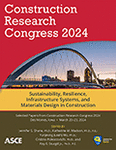Potential Factors Influencing Student Rental Housing Participation in Demand-Side Management Strategies
Publication: Construction Research Congress 2024
ABSTRACT
Buildings are responsible for the largest portion of energy consumption on US electric grids. The wide participation of buildings in demand side management (DSM) through modulating or shifting electricity end uses, particularly in homes, can support decarbonization goals and increase reliability of electric power supply. The awareness and willingness of households to adjust internal loads, housing occupancy, and household energy consumption patterns all play an important role to support the potential for DSM. A particularly challenging type of housing to reach in DSM is rental housing. Historically, this type of housing has been plagued by split incentives that limit the motivation of homeowners (landlords) to improve the energy performance of these buildings since they often do not pay the utility bills. DSM presents an opportunity to support reducing the utility bills of renters through control adjustments rather than requiring the landlord to invest in energy efficient technologies. This study aims to identify household occupancy schedules and potential factors that may influence willingness to participate in DSM among renters, in particular college students. A survey-based method was conducted among 55 college students majoring in civil, environmental, and applied engineering, and showed that, while the targeted population has low awareness about DSM strategies, they would be willing to participate in a DSM in the future. The factors that appear to drive willingness to participate in DSM for this population were related to the potential reduction of electricity costs and energy savings.
Get full access to this article
View all available purchase options and get full access to this chapter.
REFERENCES
Koul, B., K. Singh, and Y. S. Brar. 2021. “An introduction to smart grid and demand-side management with its integration with renewable energy”. Chapter 4 in Advances in Smart Grid Power System, p.73–101.
Vogiatzi, C., G. Gemenetzi, L. Massoua, S. Poulopoulos, S. Papaefthimioua, and E. Zervas. 2018. “Energy use and saving in residential sector and occupant behavior: A case study in Athens”. Energy & Buildings. pp 1–8.
Consumers Energy. Consumers Energy Smart Thermostat Program – Terms and Conditions.
Smith, C. B., and E. Kelly. 2016. “Introduction”. Chapter 1 in Energy Management Principles (Second Edition). Applications, Benefits, Savings, p.1–12.
Macedo, M. N. Q., J. J. M. Galo, L. A. L. de Almeida, and A. C. D. C. Lima. 2015. “Demand side management using artificial neural networks in a smart grid environment”. Renewable and Sustainable Energy Reviews, v 41, pp. 128–133.
Morgül Tumbaz, M. N., and H. T. Moğulkoç. 2018. “Profiling energy efficiency tendency: A case for Turkish households”. Energy Policy, v 119, pp.441–448.
Carliner, M. 2013. Reducing Energy Costs in Rental Housing the Need and the Potential. Joint Center for Housing Studies of Harvard University, v 13–2.
Nicholls, L., and Y. Strengers. 2015. “Peak demand and the ‘family peak’ period in Australia: Understanding practice (in)flexibility in households with children”. Energy Research & Social Science, v 9, pp. 116–124.
Samarripas, S., and A. Jarrah. 2021. A New Lease on Energy: Guidance for Improving Rental Housing Efficiency at the Local Level. American Council for an Energy Efficiency Economy - ACEEE. <https://www.aceee.org/sites/default/files/pdfs/u2102.pdf>.
Wijaya, T. K., T. G. Papaioannou, X. Liu, and K. Aberer. 2013. “Effective consumption scheduling for demand-side management in the smart grid using non-uniform participation rate”. Sustainable Internet and ICT for Sustainability. pp. 1–8.
US EIA. 2021. “Electric Power Annual, Table 2.2: Sales and Direct use of Electricity to Ultimate Customers by Sector”. <https://www.eia.gov/electricity/annual/html/epa_02_02.html>(May 12, 2023).
Harish, V. S. K. V., and A. Kumar. 2014. “Demand side management in India: Action plan, policies and regulations”. Renewable and Sustainable Energy Reviews, v 33, pp. 613–624.
Information & Authors
Information
Published In
History
Published online: Mar 18, 2024
Authors
Metrics & Citations
Metrics
Citations
Download citation
If you have the appropriate software installed, you can download article citation data to the citation manager of your choice. Simply select your manager software from the list below and click Download.
